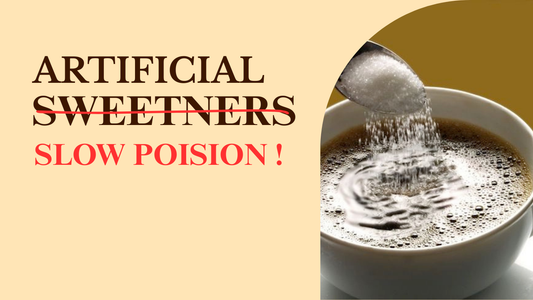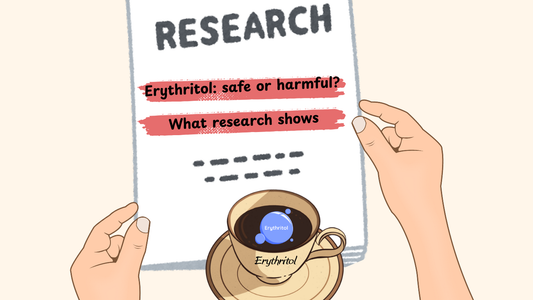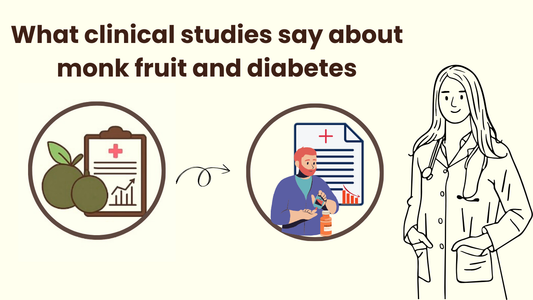Sugar Isn’t Just Empty Calories
Most people think of sugar as “extra weight” or “bad for teeth.” But the truth is far deeper and scarier: long-term sugar consumption rewires your metabolism.
It doesn’t just make you fat. It alters how your liver stores fat, how your brain craves food, how your hormones work, and how your cells age.
👉 Sugar changes the way your body functions - often permanently.
How Metabolism Works (Quick Refresher)
Metabolism = the way your body turns food into energy and building blocks.
-
Carbs → glucose → quick energy.
-
Fats → fatty acids → long-term energy storage.
-
Proteins → amino acids → repair & growth.
Your metabolism is balanced when your body knows how to burn and store fuel efficiently. Sugar disrupts that balance over time.
The Liver: Sugar’s First Victim
When you eat sugar (sucrose, fructose, jaggery, honey, etc.):
-
Glucose → used by cells for energy.
-
Fructose → goes straight to the liver.
Too much fructose overwhelms the liver.
-
Excess → converted into fat (de novo lipogenesis).
-
Leads to non-alcoholic fatty liver disease (NAFLD).
-
NAFLD is now the fastest-growing liver condition in India.
👉 Long-term sugar = fatty liver = higher risk of diabetes and heart disease.
The Pancreas & Insulin: Sugar’s Endless Demand
Every sugary meal → blood sugar spike → insulin release.
-
Insulin’s job = push glucose into cells for energy or storage.
-
Chronic high sugar = insulin always “on.”
-
Cells stop responding → insulin resistance.
-
Insulin resistance = the foundation of type 2 diabetes.
👉 Decades of sugar aren’t just about cavities. They’re about your pancreas burning out.
The Brain: Sugar as an Addictive Drug
Sugar doesn’t just fuel your body. It hacks your brain.
-
Activates dopamine reward pathways (same as drugs).
-
Creates cravings and withdrawal symptoms.
-
Leads to overeating - especially high-calorie, low-nutrient foods.
Studies show long-term sugar consumption lowers dopamine receptor sensitivity. That means you need more sugar to feel the same pleasure.
👉 Sugar is addictive, and addiction wrecks metabolism by driving overeating.
Fat Storage & Obesity
Sugar calories don’t behave like other calories.
-
Fructose bypasses appetite regulation → you don’t feel full.
-
Insulin promotes fat storage, especially belly fat.
-
Over time, you build visceral fat - the dangerous fat around organs.
Visceral fat = higher risk of heart disease, stroke, cancers.
The Inflammation Connection
Excess sugar = chronic inflammation.
-
Raises inflammatory markers (CRP, TNF-alpha).
-
Damages blood vessels.
-
Disrupts hormones.
👉 Inflammation = silent fire inside the body → accelerates aging, weakens immunity, damages metabolism.
Sugar & Hormones: A Metabolic Storm
-
Leptin (satiety hormone): Sugar blunts leptin response → brain doesn’t feel full.
-
Ghrelin (hunger hormone): Sugar keeps ghrelin levels high → constant hunger.
-
Cortisol (stress hormone): High sugar = high cortisol → belly fat storage.
-
Insulin: Always elevated → fat storage mode permanently “on.”
👉 Long-term sugar throws hormones off balance → metabolism gets stuck in fat-storage mode.
Sugar & The Gut
The gut microbiome thrives on fiber, not sugar. Too much sugar:
-
Feeds “bad” bacteria and yeast → dysbiosis.
-
Reduces microbial diversity.
-
Linked to insulin resistance and obesity.
Gut health = metabolic health. Sugar destroys both.
The Long-Term Consequences
After decades of high sugar:
-
Type 2 Diabetes → Permanent insulin resistance, high blood sugar.
-
Metabolic Syndrome → Combo of belly fat, high BP, high sugar, high cholesterol.
-
Heart Disease → Sugar damages arteries, raises triglycerides.
-
Fatty Liver Disease → Now a leading cause of liver transplants.
-
Obesity & Cancer Risk → Chronic high insulin fuels abnormal cell growth.
-
Premature Aging → Sugar molecules bind to proteins (glycation), damaging tissues.
👉 This isn’t about weight alone. Sugar poisons metabolism from multiple angles.
The India Factor
Indians are genetically more prone to insulin resistance and belly fat storage. Add sugar-loaded diets (chai, sweets, biscuits, processed foods) and sedentary lifestyles → India becomes the diabetes capital of the world.
👉 Long-term sugar isn’t just bad here. It’s catastrophic.
How to Protect Your Metabolism
-
Cut Added Sugars. Learn sugar’s 60+ names.
-
Ditch Sugary Drinks. Juices, sodas, energy drinks = liquid sugar bombs.
-
Eat Real Food. Dal, sabzi, whole grains, fruits.
-
Choose Clean Sweeteners. Monk fruit + erythritol blends (like EPRA’s).
-
Support Your Liver. High-fiber foods, antioxidants.
-
Fix Your Gut. Prebiotics, probiotics, fiber.
Where EPRA Farms Stands
At EPRA, we’re building an India that understands sugar’s long-term damage.
-
Our monk fruit blends are 0 sugar, 0 calories, 0 glycemic index.
-
Clean sweetness without metabolic harm.
-
Transparent, natural, backed by science.
👉 Because protecting metabolism means ending sugar dependency.
FAQs
Q: Isn’t sugar fine in moderation?
Moderation works in theory, but with sugar hidden in 80% of packaged foods, most people exceed safe limits daily.
Q: Is jaggery/honey safer long-term?
No. They’re still sugar, still harmful to metabolism over decades.
Q: Can metabolism recover if I quit sugar?
Yes. Insulin sensitivity and liver health improve within weeks to months of reducing sugar.
Q: Are natural sugars in fruit harmful?
Whole fruits are safe because fiber slows absorption. It’s added sugars and juices that harm.
Conclusion: Sugar Rewrites Your Metabolism
The scariest part of sugar isn’t the calories. It’s the way it rewires your body’s energy system.
-
It overloads the liver.
-
It burns out the pancreas.
-
It addicts the brain.
-
It disrupts hormones.
-
It fuels inflammation.
👉 Long-term sugar use traps you in a cycle of obesity, diabetes, fatty liver, and early aging.
The future of health in India depends on breaking this cycle - and it starts with choosing clean sweetness over hidden sugars.





